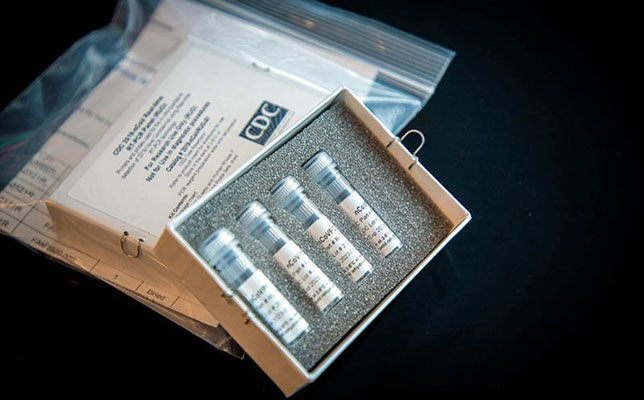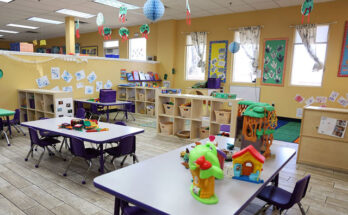Photo Courtesy of Centers for Disease Control and Prevention: The Centers for Disease Control’s laboratory test kit for COVID-19 is being shipped to qualified state and municipal public health laboratories.
By Victoria Stibrik/Cronkite News
PHOENIX – As new cases of COVID-19 are being confirmed across the globe, and some closer to home, here’s what you need to know about the fast-spreading respiratory virus.
As of March 4, there is one confirmed case and one presumptive positive case of COVID-19 in Arizona, according to state health officials. Presumptive positive means tests in Arizona determined the person has the respiratory virus, but the diagnosis has yet to be confirmed by the Centers for Disease Control.
Arizona’s single confirmed case was diagnosed in January, shortly after a man in the Arizona State University community returned from Wuhan, China, where the novel coronavirus was first detected in late December. University officials say that man has recovered and been released from isolation.
Thirty-four people have been tested for COVID-19 so far in Arizona. One was confirmed positive, one was presumed positive, 27 were negative and results are pending on five others. Because of medical privacy laws, authorities will only reveal ages and the county where the affected individuals reside.
Across the country, USA Today reported that the death toll rose to 11 on Wednesday, with two new deaths in California and Washington. The CDC has confirmed nine of those deaths, which all happened in Washington state. Eighty cases of the illness have been confirmed in 13 states, including Arizona. The CDC has determined that 24 were travel-related and 16 were spread person-to-person; the rest remain under investigation. Other states where COVID-19 has been reported are Florida, Georgia, North Carolina, New York, Massachusetts, New Hampshire, Rhode Island, Illinois, Wisconsin, California, Oregon, and Washington.
On Wednesday, the U.S. House of Representatives was expected to approve an $8.3 billion emergency appropriation to respond to coronavirus. It’s expected to move quickly to reach the president’s desk.
COVID-19 symptoms
COVID-19, which has killed more than 3,000 globally, can be difficult to detect and monitor. Symptoms in confirmed patients ranged from none to mild to severe, according to the Arizona Department of Health Services. Symptoms may appear two to 14 days after exposure to the illness, and can include:
- Fever
- Cough
- Shortness of breath
The virus is thought to spread mainly from person-to-person, likely through direct contact with respiratory droplets from coughing or sneezing.
With most respiratory viruses, people are most contagious when they’re exhibiting symptoms. With COVID-19, there have been reports of spread before patients exhibited any symptoms.
Prevention tips
There’s no vaccine to prevent COVID-19 or a cure for it, though some patients recover. Arizona health officials suggest the following actions to help prevent the spread of the illness:
- Wash hands often with soap and water for at least 20 seconds. If soap and water are not available, use an alcohol-based hand sanitizer that contains at least 60% alcohol.
- It is especially important to clean hands after going to the bathroom; before eating; and after coughing, sneezing or blowing your nose.
- Avoid touching your eyes, nose, and mouth with unwashed hands.
- Stay home when you’re feeling sick.
- Avoid close contact with people who are sick.
- Cover your cough or sneeze with a tissue or your sleeve (not your hands).
- Clean and disinfect frequently touched objects and surfaces.
Testing for coronavirus
Travel is a major factor in deciding whether to get tested, state health officials said. Seek testing if you’ve had fever and respiratory symptoms within two weeks of travel from China, or have had close contact with someone who has the symptoms and has traveled to China. Call your health care provider before your visit to alert them of your symptoms and exposures, according to the Arizona Department of Health Services.
The kit developed by the CDC tests for severe acute respiratory syndrome coronavirus (SARS-CoV-2), which is the virus that causes COVID-19. These tests can only be conducted in United States’ laboratories the CDC has designated as qualified.
Arizona Gov. Doug Ducey announced this week that Arizona will begin its own testing to produce faster results. The state has vowed to provide testing outcome updates daily, and national updates are expected from the CDC on Mondays, Wednesdays, and Fridays.
Travel
Travel out of Phoenix Sky Harbor International Airport will continue, airport spokesman Gregory E. Roybal said, and “public health officials have not requested any specific changes to Phoenix Sky Harbor’s standard health and safety protocols related to the virus.”
In addition to regular 24-hour cleaning, the airport has increased the sanitation of “high-touch areas,” such as escalator handles, Roybal said. The Phoenix Aviation Department is in touch with health officials and will take action as directed.
The U.S. State Department has issued travel warnings to some destinations, including China and cruises to or within Asia.









